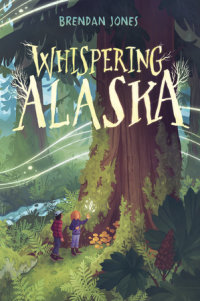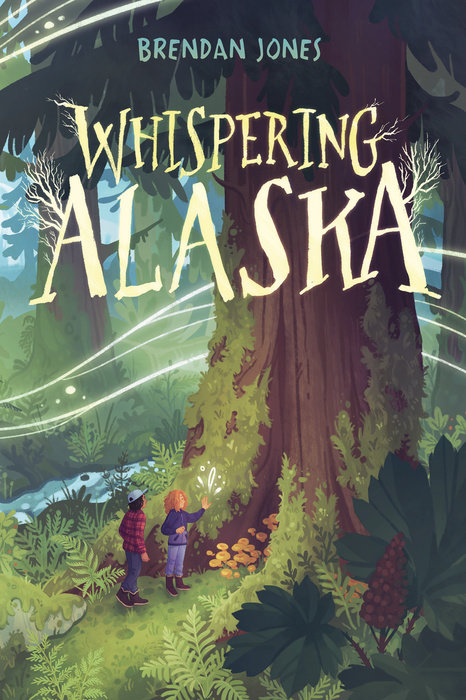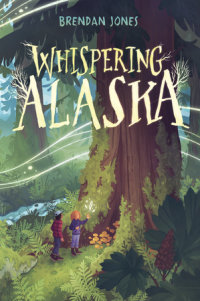Whispering Alaska
Author Brendan Jones
In this eco-focused middle-grade novel, readers follow the story of twin sisters who move with their father to a small town in Alaska for a new start after the devastating loss of their mother.
It’s been four months since their mother died. The twins and their father have moved from Pennsylvania to a small town in Alaska to be near extended family. Nicky and Josie find the wilderness mysterious and beautiful, and a much-needed refuge. The…
In this eco-focused middle-grade novel, readers follow the story of twin sisters who move with their father to a small town in Alaska for a new start after the devastating loss of their mother.
It’s been four months since their mother died. The twins and their father have moved from Pennsylvania to a small town in Alaska to be near extended family. Nicky and Josie find the wilderness mysterious and beautiful, and a much-needed refuge. The girls drifted apart somewhat during their transition, each dealing with grief in a different way. Now, as they settle into a new normal, they become involved in a community debate that threatens the very land they are growing to love.
For the local adults, livelihoods are at stake, and tensions are high. But it’s the young people who take the lead, especially newcomers Josie and Nicky, who find a way to speak up for what they believe, reconnecting with each other and with their father in the process—and, they hope, doing their mother proud. Will their heartfelt plea keep the peace and save the trees that have existed for hundreds of years?
Author Brendan Jones’s passion for Alaska shines through in this, his debut middle-grade novel. Indeed, Brendan’s day-to-day subsistence lifestyle in his own Alaskan community—a place he’s called home for decades—and his appreciation for young activists greatly inspired Whispering Alaska. The rich detail with which he describes the earth's largest intact temperate rainforest will make readers wonder whether they too can hear the trees whisper.
Recipient - 2022 Nature Generation Green Earth Book Award
“Skillfully combining the newer themes of the pandemic and environmental activism with traditional themes like family, loss, and sibling rivalries, this book is compelling and modern.” —School Library Journal
“Strong but not simple conflicts, a vividly rendered natural setting, and smoothly integrated elements of fantasy and realism crank up the intensity of this multi-layered tale.” —Booklist, starred review
An Excerpt fromWhispering Alaska
Chapter One
Gulls cawed and dove outside Nicky’s window as the RV rumbled down the steel ramp into the belly of the Alaska ferry. Nicky pressed her forehead to the smoked glass, the window splattered with mud and rain from three weeks of travel across the United States. A man wearing a protective mask waved them into the dim light. Her father checked his mirrors and slowed the vehicle as they bumped over the threshold.
Nicky unclicked her seat belt and scooted forward, resting her chin on her father’s bony shoulder. “Hey, love,” he said, brushing his whiskers against her cheek. “You ready for this?”
She peered out the windshield, watching the fluorescent lights move like clouds over the dashboard. Behind her, Josie took her iguana from her glass tank.
“I guess so.”
“I can’t believe Watermelon’s going to Alaska,” Josie mumbled.
“Iguanas love rainforests!” their father said, glancing in the mirror as he slowed to squeeze past an RV that looked like a giant toaster oven.
“Uh--we’re going to a temperate rainforest, with rocks, and ice, and trees. Iguanas come from…
Chapter One
Gulls cawed and dove outside Nicky’s window as the RV rumbled down the steel ramp into the belly of the Alaska ferry. Nicky pressed her forehead to the smoked glass, the window splattered with mud and rain from three weeks of travel across the United States. A man wearing a protective mask waved them into the dim light. Her father checked his mirrors and slowed the vehicle as they bumped over the threshold.
Nicky unclicked her seat belt and scooted forward, resting her chin on her father’s bony shoulder. “Hey, love,” he said, brushing his whiskers against her cheek. “You ready for this?”
She peered out the windshield, watching the fluorescent lights move like clouds over the dashboard. Behind her, Josie took her iguana from her glass tank.
“I guess so.”
“I can’t believe Watermelon’s going to Alaska,” Josie mumbled.
“Iguanas love rainforests!” their father said, glancing in the mirror as he slowed to squeeze past an RV that looked like a giant toaster oven.
“Uh--we’re going to a temperate rainforest, with rocks, and ice, and trees. Iguanas come from tropical rainforests. Big difference, Dad.”
A woman in low pigtails, also wearing a mask, made a fist as their father pulled into a spot. She flashed a thumbs-up, and he shoved the vehicle into park. The aluminum skin of the RV beside them reflected the mottled greens and browns of their camper.
“Girls,” their father announced as the engine shuddered and went quiet. “I’ve been saving a joke this whole trip. You ready?”
Nicky smiled to herself as she walked back to retrieve her sunglasses. She was so tired of the ratty brown rug, the shards of oily potato chips that stabbed her bare feet, the musty scent of Watermelon’s iguana poop drying under the heat lamp.
Their father did a drumroll with his fingers on the dashboard. “What do you call a fish with no eye?”
“We give up,” Josie said quickly.
“Fssshhhh,” her father said. “Get it?”
“So, so dumb,” Josie said, gasping. “Someone should report you.”
Nicky flicked her eyes over Josie. Her twin had been crabby since Mount Rushmore.
“You can probably turn those off, Dad,” Josie said as the windshield wipers moaned against the dry glass. “We’re not moving, and it doesn’t rain inside boats. Also, Nick, what’s with the shades? It’s not like you’re a celebrity.”
Their father switched off the wipers. Nicky slipped her sunglasses into her sweatshirt.
“Four more years before you drive, kiddo,” her father said. “About the same amount of time it’s going to take you to clean that green dye off your hands.”
“Three. I get my learner’s permit at fifteen,” Josie shot back. “At least in Pennsylvania. And my hair color is called Evergreen.”
As Josie swung open the door, a soda can rolled down the steps, clanking onto the concrete. Subway and McDonald’s wrappers, along with a plastic Starbucks cup with whipped cream dried along the rim, littered the carpet. As the trio crossed the country, their father had favored drive-thrus and packaged food, obsessively cleaning each object with disinfectant wipes. If Nicky never took another bite of beef jerky, or saw another package of glazed sticky buns in her life, she’d be just fine.
Even though the first wave of the pandemic had passed, she understood her father’s reluctance to fly. He chose their route according to which states were not shut down, tracking infection rates, and the number of positive cases as they considered where to sleep for the night. Take no chances, he told them. So they tolerated swabs stuck up their nose at least once a week, to make sure the virus hadn’t found them. COVID had already broken their family once. At the Presbyterian church, at their mother’s funeral--it had all been a blur--he had vowed to both of them he would not let it happen again.
This meant they weren’t even allowed to walk over to other sites at the RV parks. They couldn’t use the bathrooms or playgrounds or pools or showers or splash parks--most were closed, anyway--or even go into the camp store without wearing an N-95 mask, no matter what the requirements were. “You’re lucky I don’t put you in a T100, with full facial protection,” he told them.
Josie and Nicky knew better than to argue. The virus had left them without a mother. They weren’t about to pretend it couldn’t touch them--it already had, and it continued to. Nicky would be looking out the window, watching buffalo charge into the hills of Yellowstone National Park, and there her mother would be. Standing at the top of a hill. Watching her.
As they started to unload their bags from the RV, Josie tapped Nicky’s shoulder and whispered, “Hey. Do you think Mom ever would have dreamed of sleeping on a boat?”
“Maybe,” Nicky said. “She liked adventures.”
“Trips to the Jersey Shore. Not across the whole country. To Alaska. On a boat,” Josie huffed.
Their parents had met at an open-mic night in Danville. Her mother had heard her father play guitar, and--as she told it--couldn’t think straight afterward. She called him for lessons. The rest, her father liked to say, winking at the twins, was history.
A couple of times, Nicky had caught them, in the kitchen or in their bedroom, singing together. If a tinker was my trade, would I still find you? Then her mother’s deep alto voice would chime in. I’d be carrying the pots you made, following behind you.
This line always made Josie laugh, because both she and Nicky knew that their mother led their family, even if their father had worked hard giving lessons and tending bar to put their mother through medical school. “You girls wouldn’t be living in a beautiful old house like this, or riding in a shiny black pickup, if it weren’t for your dad.”
As Josie shuffled through her backpack, Nicky searched for the right response, finally giving up. “I guess I don’t really know,” she admitted.
Josie snorted. “I do.”
Aside from a couple trips to Philadelphia, or the New Jersey Shore to see their grandparents, their family hadn’t really left Danville much. Josie’s mother was always working in the hospital emergency room, which she vowed one day to direct. They went to Knoebels, the amusement park across Interstate 80 that had the Phoenix, the wooden roller coaster her mother loved to ride. Or hiking in Ricketts Glen. That was about all.
Josie slipped the hood of her Danville Ironmen sweatshirt over her head. “Now that I think about it, Mom didn’t like adventures at all. She liked work, and her yoga, and coming home in the evenings. In fact, she would have thought we were being cowards, running away from home like this. Just leaving the house, and our lives, behind.”
Nicky didn’t know if she agreed with this. Nevertheless, she kept her mouth shut, focusing on packing for the next three days on the ferry.
Even though they were technically called “mirror twins,” Nicky found that her thoughts rarely matched her sister’s. As Josie always said, if you put two mirrors together, you just got infinity. No end, no beginning. They were reflections of each other, their mother had told them. “When you’re unsure about something, just look at your sister, and you’ll see things more clearly. Never forget. You girls are so lucky to have one another.”
Though they both had dimples and strawberry-blond curls--at least when Josie didn’t dye hers Christmas-tree green--Josie’s parted to the left, and Nicky’s to the right. Josie wrote with her right hand. Nicky wrote with her left. The birthmark they had each been given by their mother, the one she always said resembled an upside-down Sicily, appeared on opposite shoulder blades. Even their organs were on opposite sides--including their hearts. Josie’s was on the left--the “normal” spot for a heart, as she never tired of pointing out--while Nicky’s lived on the right side of her chest. Which meant that when they hugged, they could feel the other’s heart beating just inches from their own.
Since leaving Danville, Nicky couldn’t once recall hugging her sister.
Nicky had overheard her mother tell her father that she thought the girls used different sides of their brains to understand the world. “Nicky drops into her own universe,” her mother had said. “She’s probably more like you in that way. She’s the storyteller. The right-brained one.”
Nicky often wondered what her mother had meant by this. Her mother understood everything about the body, so she wouldn’t have made the comment without knowing exactly what she was talking about.
It made sense to her that if their hearts were on opposite sides of their bodies, then they’d also be controlled by opposite hemispheres of the brain. It was also true that Nicky liked art, drawing with colored pencils, and cutting out collages. She preferred a walk in the fields or fishing in Uncle Max’s pond to writing English papers or solving math problems--that was Josie’s realm. Nicky liked working for Uncle Max, tallying her hours helping him stack bales of hay in the barn, sweeping out the corncrib, raking leaves from beneath the black walnut and setting the piles on fire.
But what about the other part, about being able to drop into her own world?
In the four months since her mother had died, she’d found herself aching to ask her mother what she had meant. Nicky knew her mother didn’t approve of hiding from anything, so she wanted to confront this truth. She often told the girls to “trust in what is difficult,” because difficult things made you stronger. Once, she had caught Nicky reading a fantasy book. “You need to learn to cope in a world without elves and unicorns,” she said, taking the book away. Nicky never saw it again.
All Nicky knew for sure was that when she climbed to the top of Uncle Max’s farm, passing beneath the big Chinese chestnuts, her world evened out. She had never mentioned this to either of her parents, or even to her sister--how, in the shadows of trees, where the beeches grew among the furnaces and farm machinery rusting back into the soil, Nicky could sometimes hear the tiniest whisper of the beech saplings as they pressed up through the leaves. It wasn’t the Phoenix at Knoebels, or the baseball games by the Susquehanna River, or even her room or her friendships that thrilled her. It was walking beneath the trees in World’s End State Forest, or Ricketts Glen, or Uncle Max’s farm. Listening to the crisp shirring of the leaves.
“Hey,” her sister said as she zipped up her backpack. “Paging Nicole Hall from whatever universe she’s traveling through. Please reconnect with your terrestrial body so we can complete this bizzarro journey and resume something approaching a normal life. Are you packed?”
“I’m here,” Nicky said, zipping her bag.
“Everyone have what they want?” their father asked. “Three nights on this old scow. Better get warm clothes.”
“I can’t wait for a real bed,” Josie said, sighing.
Their father’s army duffel thudded onto the concrete. Then he crouched and pulled both girls into his arms. His whiskers felt scratchy against Nicky’s cheek. He smelled like sweat and pistachios, which he had eaten the whole way across the country, flinging the shells out the window, despite Josie’s accusations of littering.
“Girls,” he said as he held them. “Do you know how much I love you?”
“Dad, can we not do this right now?” Josie said, rolling her eyes and squirming to get away.
He cleared green curls from Josie’s cheeks. Nicky could see from his pink eyes and flushed cheeks that he was crying. “I want you to know that you are two of the strongest, most impressive kiddos I’ve ever seen. When we drive off this boat, we’ll be in Alaska. Can you believe that? Aunt Mall and your cousin Clete, who’s just your age, will be waiting. Maybe Uncle Cliff will take us on his boat to fish for salmon. Or we’ll go looking for grizzly bears. But the most important thing is that we’re a family. Together.”


